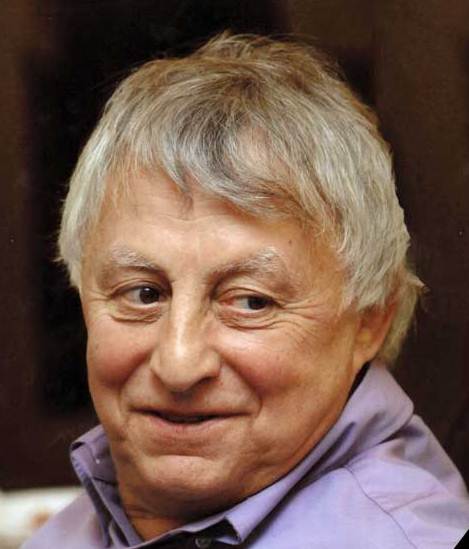 Andrei Mikhailovich Finkelstein in the 2000s. Photo courtesy of EVN Archive
Andrei Mikhailovich Finkelstein in the 2000s. Photo courtesy of EVN Archive
Andrei Mikhailovich Finkelstein
Contributed by Colleagues at Institute of Applied Astronomy, Russian Academy of Sciences
Andrei Mikhailovich Finkelstein was born in evacuation in the city of Tavda, Sverdlovsk Region, on February 7, 1942, during WWII. In 1968, he graduated from the Leningrad State University. From 1969 to 1973 he worked at the Institute of Theoretical Astronomy of the USSR Academy of Sciences, In 1973-1988 - at the Leningrad branch of the Special Astrophysical Observatory of the USSR Academy of Sciences, where he rose from junior researcher to Head of the branch. From 1988 he worked at the Institute of Applied Astronomy of the USSR Academy of Sciences (from 1992 - Russian Academy of Sciences) as a Director. He was Doctor of Physical and Mathematical Sciences (1990), Professor in Astrometry and Celestial Mechanics (1999), Corresponding Member of the Russian Academy of Sciences in Astronomy (2003), Foreign Member of the Royal Swedish Academy of Engineering Sciences, Honored Scientist of the Russian Federation (1999 ), laureate of the Prize of the Government of the Russian Federation in the field of science and technology (2004).
Andrei Finkelstein is widely known as one of the leading experts in the field of relativistic celestial mechanics, space geodesy and Very Long Baseline Interferometry (VLBI). He is one of the founders of a new scientific field - fundamental coordinate-time support, which arose in the early 1980s at the intersection of astrometry, radio astronomy and radio engineering. In the early 1980s, A.M. Finkelstein developed the first complete post-Newtonian relativistic theory of VLBI observations, the basis of which is currently used as a standard for reductions of high-precision astrometric and geodetic VLBI measurements. At the same time, he developed new efficient algorithms for resolving the phase ambiguity of VLBI observations using multifrequency methods.
Since the mid-1980s, Finkelstein began working on the scientific and technical substantiation of the project to create a permanent VLBI network for solving problems of astrometry, geodynamics and space geodesy, the practical implementation of which was carried out within the framework of the Kvazar-KVO project. In 1987, the Institute of Applied Astronomy of the USSR Academy of Sciences was established to implement this project, and A.M. Finkelstein was appointed its Director. Under the leadership of A.M. Finkelstein Institute has become one of the largest astronomical institutions in the country and the leading Russian institute in the field of radio astrometry, space geodesy and VLBI technology.
Finkelstein was a researcher with broad interests. He published 268 scientific papers in domestic and international scientific media. He was active in teaching, was Head of the Department of Radio Astronomy of the St. Petersburg State Electrotechnical University, Head of the branch of the Department of Radio Physics of the St. Petersburg State Polytechnic University. Among his students are 12 doctors and candidates of sciences.
He was Chairman of the Scientific Council of the Russian Academy of Sciences on the problem of "Coordinate-Time and Navigation Support", Chairman of the section "Astrometry, Celestial Mechanics and Applied Astronomy" of the Scientific Council of the Russian Academy of Sciences for Astronomy, a member of the Consortium Board of Directors of the European VLBI Network (EVN), a member of the Board of Directors of the International VLBI Service for Geodesy and Astrometry (IVS). A.M. Finkelstein was a laureate of the A.F. Ioffe Prize of the St. Petersburg Scientific Center of the Russian Academy of Sciences and the Government of St. Petersburg.
A.M. Finkelstein died on 18 September 2011.
![[IAU logo]](iau_wb_thumb.jpg)
![[URSI logo]](URSI-logo-thumb.jpg)
![[Karl Jansky at his antenna]](jansky_photo_02_thumb.jpg)
![[Reber's Wheaton antenna]](Reber_Telescope_Wheaton_thumb.jpg)
![[Dover Heights]](Dover_Heights_02_thumb.jpg)
![[4C telescope]](GB61-195_4C_telescope_thumb.jpg)
![[Ewen and horn antenna]](ewen_horn1s.jpg)
![[Dwingeloo, 1956]](Dwingeloo-1956-thumb.jpg)
![[Jocelyn Bell Burnell and Cambridge antenna used in pulsar discovery]](burnell2_thumb.jpg)
![[Lovell Telescope at Jodrell Bank]](site_1594_0001-500-334-20180316163019-thumb150.jpg)
![[Wilson, Penzias, and Bell Labs horn antenna]](wilson-penzias-horn_thumb.jpg)
![[6-m Millimeter Radio Telescope in Mitaka, Japan]](6m-thumb.jpg)

